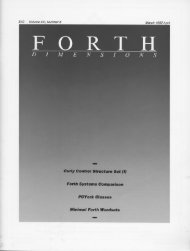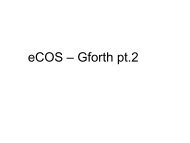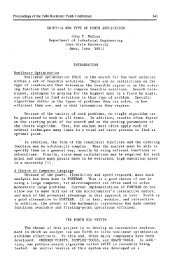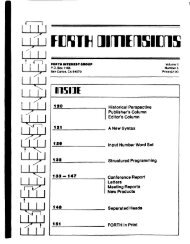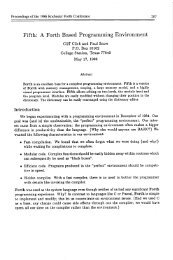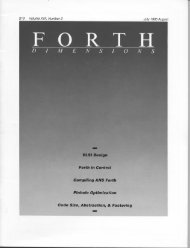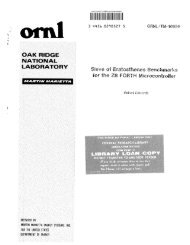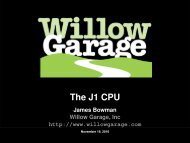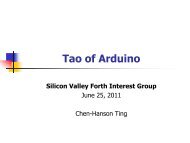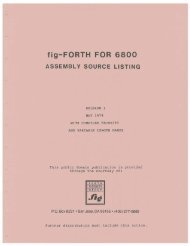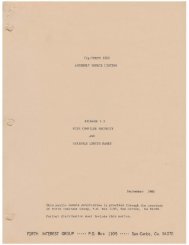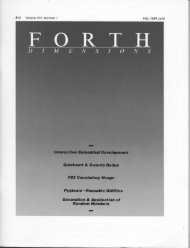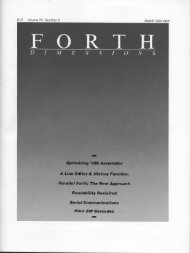5 - Forth Interest Group
5 - Forth Interest Group
5 - Forth Interest Group
Create successful ePaper yourself
Turn your PDF publications into a flip-book with our unique Google optimized e-Paper software.
pigum Eleoen, continued.)<br />
METHOD: W-GOTOXY ( x y addr -- )<br />
\ Cursor addressing within the window<br />
UPPERLEFT IN RECT D+ GOTOXY<br />
METHOD ;<br />
METHOD: W-HOME ( addr -- )<br />
\ Move cursor to the window home position, upper left<br />
UPPERLEFT IN RECT GOTOXY<br />
METHOD;<br />
METHOD: W-LLC ( addr -- )<br />
\ Move the cursor to the lower left corner of window<br />
WSIZE + DUP @ SWAP WSIZE + @ GOTOXY<br />
METHOD:<br />
METHOD: W-BORDER ( addr -- )<br />
\ Draw a border around the window using IBM character set<br />
DUP >R UPPERLEFT IN RECT R> LOWERRIGHT IN RECT<br />
\ The window parameters are now on the stack<br />
OVER 1+ 4 PICK<br />
DO \ Do two sides<br />
I 3 PICK 1- GOTOXY OC4 EMIT<br />
I OVER 1+ GOTOXY OC4 EMIT<br />
LOOP<br />
DUP 1+ 3 PICK<br />
DO \ Do the other sides<br />
OVER 1+ I GOTOXY OB3 EMIT<br />
3 PICK 1- I GOTOXY OB3 EMIT<br />
LOOP<br />
OVER 1+ 3 PICK 1- GOTOXY OBF<br />
3 PICK 1- OVER 1+ GOTOXY OCO<br />
1+ SWAP 1+ SWAP GOTOXY<br />
1- SWAP 1- SWAP GOTOXY<br />
METHOD ;<br />
DECIMAL<br />
community for whom re-<br />
usability of code is not<br />
important.. .." "<strong>Forth</strong> has<br />
acquired an unfortunate<br />
reputation as being highly<br />
non-portable, and GB's<br />
comments serve to rein-<br />
force this impression."<br />
". . .throw away time and<br />
effort needed just for a<br />
marginal gain in execu-<br />
tion speed.. .."His [GB'sl<br />
work does not require<br />
portability.. ." "No stan-<br />
dardis needed<br />
who plan to ignore it any-<br />
how ..." "... ER and GB's<br />
responses add unfortu-<br />
nate confimation to the<br />
suspicion that the MI<br />
team is writing a new<br />
'Ian<br />
to pas Off as "*'"<br />
<strong>Forth</strong> Dimensions<br />
ANSI team is dominated<br />
by people who do not<br />
place much value on<br />
portability-and Greg<br />
Bailey says as much."<br />
These and many similar<br />
passages from recent<br />
postings of John's serve to<br />
create, by repetition, the er-<br />
roneous impression that<br />
members of the TC, includ-<br />
ing myself, have little or no<br />
interest in portability or reus-<br />
ability of code and are doing<br />
grievous harm to what John<br />
sees as <strong>Forth</strong>. In fact, this is<br />
an erroneous interpretation<br />
of at least my position, and I<br />
Pmume that the '00' of the<br />
problem is that at least until<br />
the semantic issue I men-<br />
tioned on 16 August is dari-<br />
fed, John will continue to<br />
EMIT ( urc)<br />
EMIT ( llc )<br />
OD9 EMIT ( lrc )<br />
ODA EMIT ( ulc )<br />
misunderstand the motives<br />
and actions of the TC.<br />
Simply stated, again, my<br />
understanding of John<br />
Wavrik's position is that to<br />
him <strong>Forth</strong> means (and I pre-<br />
sume he believes it was in-<br />
tended to mean) a static,<br />
open implementation model.<br />
For example, he considers<br />
that <strong>Forth</strong> includes a word<br />
spelled DOCOL that, when<br />
executed, returns a value that<br />
can be passed to , (comma)<br />
with specific and well-de-<br />
fined meaning having to do<br />
with the creation of a body of<br />
executable code. He also<br />
believes that <strong>Forth</strong> includes<br />
words spelled ?BRANCH and<br />
OBRANCH that are, and I<br />
gather must be, used in<br />
implementing control-flow<br />
words. He feels likewise<br />
about the existence, and<br />
likewise about a method of<br />
implementation that should<br />
be guaranteed to work, for<br />
LIT. John, am I misstating<br />
your position here at all? I<br />
don't think I misunderstand<br />
you. What I have heard you<br />
say befo~ is that you don't<br />
really care what it is, but<br />
whatever it turns out to be<br />
you want it all (i.e., you<br />
really strongly desire a standard<br />
that prescribes an<br />
implementation-whether<br />
you draw the "architectural"<br />
boundary there or not-at<br />
least completely enough that<br />
you know and can manipulate<br />
the executable text of a<br />
colon definition; that you<br />
krww and can manipulate<br />
the structure of the dictionary;<br />
and so on). My understanding<br />
of your position is<br />
that a laudable standard could<br />
be formed by taking virtually<br />
anygood implementation of<br />
<strong>Forth</strong>, documenting the<br />
whole thing, and saying that<br />
standard <strong>Forth</strong> must be<br />
implemented in this way on<br />
all computers.<br />
Before I reply in detail to<br />
your postings, I think it would<br />
be useful to refine with you<br />
the above paragraph as<br />
needed, so that what we<br />
have is a concise but accurate<br />
statement of where you<br />
draw the line.<br />
At the same time, so that<br />
we can all calibrate your sensitivity<br />
to the performance<br />
one may expect of an application<br />
written in <strong>Forth</strong>, I<br />
would like to know what<br />
you mean by "marginal gains<br />
in speed." For example, is a<br />
lox performance improvement<br />
on a given CPU marginal<br />
to you? Readers of these<br />
postings might erroneously<br />
conceive, for example, that<br />
the architecture-independent<br />
definition of <strong>Forth</strong> we have<br />
tried to write in the dpANS<br />
was undertaken for no other<br />
reason than to permit implementations<br />
that shave a few<br />
percent off execution speed.<br />
Nothing could be farther from<br />
the truth.<br />
I<br />
January 1992 February



